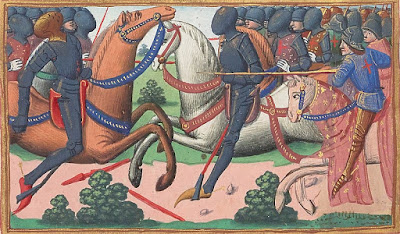Brunetto Latini's description of the horse 1/2
 |
| Les Vigiles de Charles VII, manuscript byMartial d'Auvergne, c.1484, BnF, Manuscrit Français 5054 Public domain image |
Brunetto Latini (c. 1220-1284) was a Florentine notary. He lived in exile in France from 1261 to 1268, due to the defeat of the Guelph party to which he belonged. During this time, he wrote the Livre du Trésor, an encyclopaedia, which contains a chapter about the horse, between the one on the camelion (a fantastical version of the cameleon) and the Oliphant.
The original work is written in 13th century French. Here I have translated the version of this text found in one of the manuscripts of the Livre du Trésor, dating from 1380-1405 and made in Paris by an illuminator, Perrin Remiet and kept at the Bibliothèque nationale de France.
This is the first half of this chapter, which gives an interesting insight into the way medieval people saw horses, including myths and stereotypes.
“Of the horse
The horse is a beast of great knowledge, because what he observes in men gives him so much perception that he knows his master, and often he changes his behaviour and habits when he changes masters. He senses battle and is eager for it, and rejoices at the sound of the trumpets; [the horses] are happy when they are victorious and sad when they lose, and a man can see that the battle will be won or not by the way the horses show joy or anger.
There are horses who know well the enemies of their master, for they bite and strike them with much violence, and there are some who only carry their rightful master, like the horse of Julius Caesar and the horse of Alexander, who was called Bucephalus, and who first let himself be tamed and ridden like a dumb beast, but who after he was ridden by Alexander, would not suffer any other man in the world to touch him in order to ride him.
And you must know that Bucephalus had the head of a bull and a very proud gaze and that he also had, in the middle of the brow, two lumps, like horns.
And there was the horse of Claretei, the duke of Galitas, who, when his master was dead and the king Anthiocus got on him to fight, ran down a great hill and fell in such a manner that he killed himself and his master, or rather his rider.
And when the king of Stichesse fought hand to hand with his enemies, he was killed during the battled. The others wanted to despoil him and cut his head, but the horse quickly defended him and guarded him until his own death, because he no longer wanted to eat.
It is a proven thing that many horses cry and shed tears for the death of their master, and no other beast does so.
And you must know that male horses have a long life, because we read about the horse who lived for seventy years, but the female does not live long.
You can temper their lust by removing and cutting their mane, but from them comes a love spell that groves on the brow of the foal; but the mother removes it with her teeth, because she does not want this thing to be acquired by men. And should you remove it yourself, you must know that the mother will not give her foal any milk.
His nature is such that the horse is healthier and has a better heart the more deeply he plunges his nose and mouth in the water when he drinks.”
The second part of this chapter will be published next week.



Comments
Post a Comment